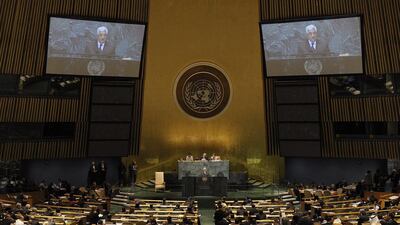At the beginning of June, Pope Francis hosted an extraordinary event at his home in the Vatican, at which the Palestinian Authority’s president Mahmoud Abbas and Israel’s then president, Shimon Peres, prayed together for peace. Last week Mr Peres, now retired, attempted to build on that by presenting the Pope with his plan to set up “a sort of United Nations for religions”. This was needed, he said, because “people who shoot the most these days, nearly always say they are doing it in God’s name. What is needed is an unquestionable moral authority that says in a strong voice ‘No, God does not want this and does not permit it.’”
Whatever comes of Mr Peres’s idea – and while the Pope listened carefully, his spokesman emphasised that he “did not make a personal commitment” – there will be those who will dismiss such an imaginative and potentially valuable interfaith initiative from the start. Peres’s UN of religions, they will say, would be nothing more than a “talking shop”.
This term is frequently used disparagingly about a variety of other groups, like the Commonwealth, the Organisation of Islamic Cooperation (OIC), the Non-Aligned Movement (NAM), the UN Alliance of Civilisations, and the UN itself, as its secretary general, Ban Ki-Moon, has acknowledged.
“Detractors,” he once wrote, “often call the United Nations a ‘talking shop’ of 192 nations where, it has memorably been said, ‘no issue is too small to be debated endlessly.’ ”
Well, I say, let’s hear it for talking shops. For a start, the contempt that informs the term ignores the fact that there is a virtue in the participants conversing in the first place. You are at least slightly less likely to launch an attack against someone with whom you have just been socialising and discussing than someone with whom you have never had any personal contact. Talks, behind the scenes or in the open, have paved the way for the resolution of innumerable conflicts around the world. They may have been protracted and sometimes unsuccessful (most obviously in the case of Palestine and Israel), but the effort is always worth making, as Winston Churchill famously noted. “To jaw-jaw,” he said, “is always better than to war-war.”
The benefits that can come from personal interaction are not always formally quantifiable. Who could have known that during deadlocks in the Northern Ireland peace process, the trick that would dissolve tensions was the province’s British secretary of state, Mo Mowlam, taking off her wig? (This resulted in quite a sight: she had lost nearly all her hair during cancer treatment, and only a couple of stray tufts survived.)
As the economist Jeffrey Sachs explains in his book, To Move the World: JFK’s Quest for Peace, it was John F Kennedy and Soviet leader Nikita Khrushchev who defused the Cuban Missile Crisis themselves, against the advice of many of their more bellicose advisers, precisely because of the chemistry and understanding they had developed.
The pair had first met when Kennedy was still a senator, at a meeting in Washington that was not about action, that had no concrete purpose beyond making introductions and talking. The rapport that was to flow from exactly the kind of event supposedly useless “talking shops” sponsor, saved the world from nuclear destruction.
That is not to say that the recognition of what we have in common – and the belief in that is what undergirds most of the international groups in this category – always translates into obvious achievements. This is a fact that the last secretary-general of the OIC, Ekmeleddin Ihsanoglu, and his team pretty much acknowledged when I met them at the US-Islamic World Forum in Doha last year. It is not always easy to answer the question: what does the OIC or the UN Alliance of Civilisations actually do?
But maybe this is to miss the point. Imagine returning from an evening dinner with a friend, only to be asked what, beyond consuming, say, an iced tea and a shawarma, you had achieved. “Well, we talked,” one would almost certainly reply. If the follow up was then, “Yes, but what did you actually do?” one would have to assume that the interlocutor had no understanding of the nature of friendship. Talking was the purpose. If we can recognise the normality and worth of such shared time between individuals, and larger groups of individuals, why should we not think it highly sensible to try to extend such comity among nations – by meeting in the organisations derided as talking shops?
While rules and treaties can be forced on lesser powers by greater ones, lasting agreement rests on the free acceptance reached after a discussion of equals – as happens, quite remarkably when one considers the disparity between member states, at the UN.
These agreements may only be arrived at slowly and after much painstaking negotiation. But the talking that goes on at such organisations is the precondition, as Mr Ban has also argued: “Talking sometimes achieves something, too. It’s the talk that puts UN peacekeepers on the ground. It’s the talk that raises the money and mandates the programmes that feed so many of the world’s hungry. It’s the talk that marks the world’s first steps towards dealing with climate change, the global food crisis and a daily array of humanitarian crises.”
That’s something to remember the next time you hear the term “talking shop” airily bandied about. Just where, in fact, would we be without them?
Sholto Byrnes is a Doha-based commentator and consultant


